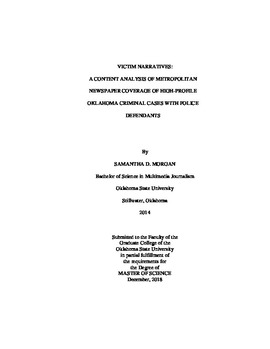| dc.contributor.advisor | Senat, Joey | |
| dc.contributor.author | Morgan, Samantha Denece | |
| dc.date.accessioned | 2019-07-10T20:48:04Z | |
| dc.date.available | 2019-07-10T20:48:04Z | |
| dc.date.issued | 2018-12-01 | |
| dc.identifier.uri | https://hdl.handle.net/11244/320421 | |
| dc.description.abstract | The rights of the accused and the rights of the free press have often stood at odds. Even when news was simple neighborhood gossip, it posed risk to the rights guaranteed under the Sixth Amendment. As media has evolved, the judicial remedies in place have not. A lack of social science research in this area and complacency in the courts have developed into a lack of preparedness for criminal cases with intensive media coverage. This study examines the concept of victim portrayal as emotionally prejudicial media. This thesis performed a content analysis of two high-profile criminal cases in Oklahoma with similar victims and defendants but different outcomes. The study found victim narrative is positively and significantly correlated to connections with a larger national theme (i.e. police brutality, violence against African-Americans, etc.). These findings suggest the more victim support or victim voice is included in articles, the more often these will be combined with conversations about crime at a national level. Specific to these cases, victim narrative was most often connected to the national theme of police brutality against African-Americans. Surprisingly, the study showed identification of the victim was positively and significantly correlated to criminal history. One possible explanation for this phenomenon is the issue of cognitive dissonance created when a police officer commits a crime, as happened in both case studies. It is likely blame is shifted from the accused to the victim, especially in cases where the victims have criminal histories or a history of drug abuse, to reconcile and resolve that cognitive dissonance. | |
| dc.format | application/pdf | |
| dc.language | en_US | |
| dc.rights | Copyright is held by the author who has granted the Oklahoma State University Library the non-exclusive right to share this material in its institutional repository. Contact Digital Library Services at lib-dls@okstate.edu or 405-744-9161 for the permission policy on the use, reproduction or distribution of this material. | |
| dc.title | Victim Narratives: A Content Analysis of Metropolitan Newspaper Coverage of High-Profile Oklahoma Criminal Cases with Police Defendants | |
| dc.contributor.committeeMember | Shipka, Danny | |
| dc.contributor.committeeMember | Cooley, Skye C. | |
| osu.filename | Morgan_okstate_0664M_16054.pdf | |
| osu.accesstype | Open Access | |
| dc.description.department | Mass Communications | |
| dc.type.genre | Thesis | |
| dc.type.material | Text | |
